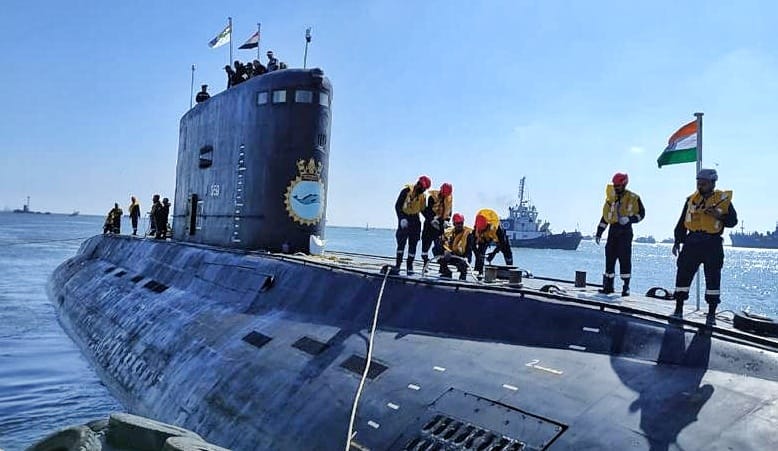

Indian Navy at Port Said in Egypt in April 2023 (Photo: Indian embassy)
The last three years, which have been tectonic in a changing global order have impacted India greatly, but that has been for the positive.
Retired Lieutenant General Syed Ata Hasnain, speaking at the Usanas Foundation’s Maharana Pratap Annual Geopolitics Dialogue, in Udaipur recently said this is the time to examine India’s place in the world. A highly optimistic Hasnain said the most important aspects about India are that it is fast racing towards its goal of a $5 trillion economy by 2030 and then towards the next goal of $10 trillion by 2035.
The retired general said that not only has the country bounced back from the ill-effects of the pandemic demonstrating its resilience, but also its willingness to help other countries with vaccines. “That has shown our importance and role in the world. Our human resources, science and technology, IT and innovations are impacting the world even as these bring benefits to common Indians”, Hasnain said.
The decorated veteran said that in the global institutions also, India has been moving up in the pecking order.
He said: “We have shaken ourselves out of BRICS and are moving on to the next level which is the chairing of the G20”.
India is the only country to be part of both – the four-member QUAD and the Shanghai Cooperation Council (SCO), an achievement which not many countries can claim. This also shows that India can straddle different worlds of opinion, Hasnain added.
However, because of changing global dynamics, India will have to keep revaluating and reconsidering its role in world affairs. He said that the other qualities that support India in standing out in a new world include India’s “stated position of neutrality”, not getting into wars and building deterrence.
To propel India forward, some of the important tasks would include re-examining our role in the UN and sticking to our Net-Zero pledge for 2070 because climate change and environmental disasters are shaking up the foundations of human existence.
Hasnain highlighted India’s position in context of global happenings like the spread of coronavirus from Wuhan; the Russia-Ukraine war and subsequent economic crisis as well as the meltdown in the American and European banking sector. The other drivers of world politics have been the re-emergence of terror outfits in the Afghanistan-Pakistan region in the wake of the US withdrawal.
He highlighted how China rose as a power supported by the notorious wolf-warrior diplomacy but suffered a setback as the aggressive strategy failed to win friends, while its Belt and Road Initiative (BRI) lies on the verge of collapse. Speaking about China, he added that the strategic shift of Asia-Pacific to Indo-Pacific and renewed focus on the Indian Ocean region has also pitchforked India into the limelight.
Also Read: India must invest in mission mode on critical technologies, economy to stave off China challenge
The Inaugural Army-to-Army Staff Talks between the Indian Army and the Royal Saudi Land Forces…
Chief Policy and Political Affairs Officer of the American Jewish Committee, Jason Isaacson, on Friday…
The house of Lashkar-e-Taiba terrorist Adil Thokar, also known as Adil Guree, has been demolished,…
The government has issued an official notification on holding the Indus Water Treaty in abeyance,…
Immunisation efforts are increasingly at risk as misinformation, population growth, ongoing humanitarian crises, and funding…
India on Thursday donated 4.8 tons of vaccines to Afghanistan, including vaccines for rabies, tetanus,…